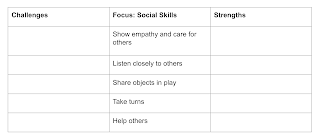Assessment in Kindergarten
"Informed by assessment" is one of the six IB's ATTs (Approaches to Teaching). Assessment is an ongoing process, embedded in learning and teaching.
Quoting from the recent publication, The Early Years in the PYP, when teaching is informed by assessment, learners:
- reflect on their learning
- adjust their learning in response to reflection and feedback
- co-construct learning goals with educators
- have conversations with peers and educators about their learning, including conceptual understanding, knowledge and the ATL skills
- engage in feedback practices, including conferencing in small groups, and using language that supports the learning of others.
There are four dimensions for assessment in the PYP which all relate to one another and help to evidence learning. These dimensions are monitoring, documenting, measuring and reporting of learning, and they all inform learning and teaching.
What have I been monitoring, documenting and giving feedback on?
Working theories, understanding of concepts, acquisition of knowledge, children's play and inquiries, and the development of skills - some subject-specific, but mainly approaches to learning (social, communication, self-management, research and thinking skills).
How am I monitoring and documenting?
- Careful Listening
- Pedagogical documentation to plan responsively
- Questioning
- Conferencing
- An online platform (Seesaw) to share photos, videos, quotes and observations - which is also a form of reporting
- Anecdotal records of observations of individuals and small groups. Some observations are planned with a specific focus and a specific group of children. Some are more spontaneous and responsive to significant moments in children's play and inquiries.
To focus observations on specific success criteria, our team are going to try and use the idea of a 1-point rubric (often used to document levels of understanding) but instead use the template to focus on approaches to learning.
How are children engaged in reflection?
Key is to embed reflection in the learning process each day. Sometimes it is in the middle of or the end of a period of time. In addition, the last 15 minutes of every day is for reflection as a whole class, responding to sentence starters or questions, often making use of the documentation gathered and thinking of possible next steps. Examples of reflection prompts include:
How are learning goals co-constructed?
The focus has been on modelling goals for the class based on observations about what has been challenging (especially some of the ATLs).
Recently, children developed their own personal goals to share in 3-way conferences and had support in thinking about how to achieve their goal. This was based on the protocol of "2 Stars and a wish" but adapted to "2 Stars and a goal".
Although this is proving successful, there is not yet a culture where learning goals are frequently referred to and reflected upon.
I am thinking about the best visuals and protocols to experiment with and adapt. Here are some options so far.
How does feedback and feed forward work in Kindergarten?
As well as observing children spontaneously in their play and participating in class discussions, I am also very intentional in conferencing with individual children and small groups so that feedback and feedforward offered is authentic and relevant.
Peer feedback is neither systematic or frequent in my Kindergarten class. We have focused on the skills and dispositions of being good partners which of course will help. I need to implement a meaningful, yet accessible protocol for pairs to or small groups to feedback. One idea I might try is TAG.
T - Tell your friend something positive
A - Ask a question
G - Give a suggestion
Another idea is to be more explicit in unpacking what "good" looks like. For example, good listening, good playing in groups, good drawings...
Reflection questions:
Which assessment practices connect to what you are already doing?
Which assessment practices have prompted ideas or action for you to develop your repertoire?
Which assessment practices are in your repertoire that could help me grow as an assessment-capable practitioner?








Comments
Post a Comment